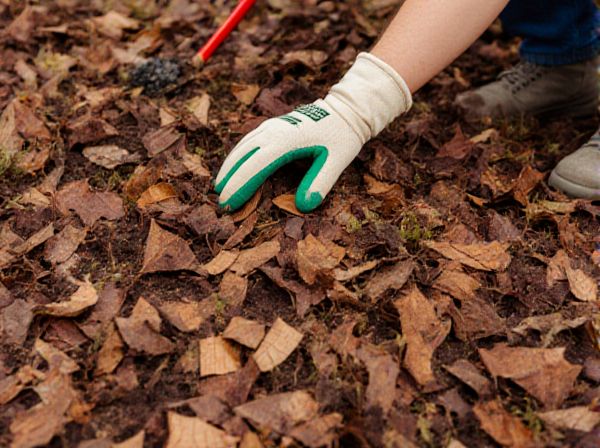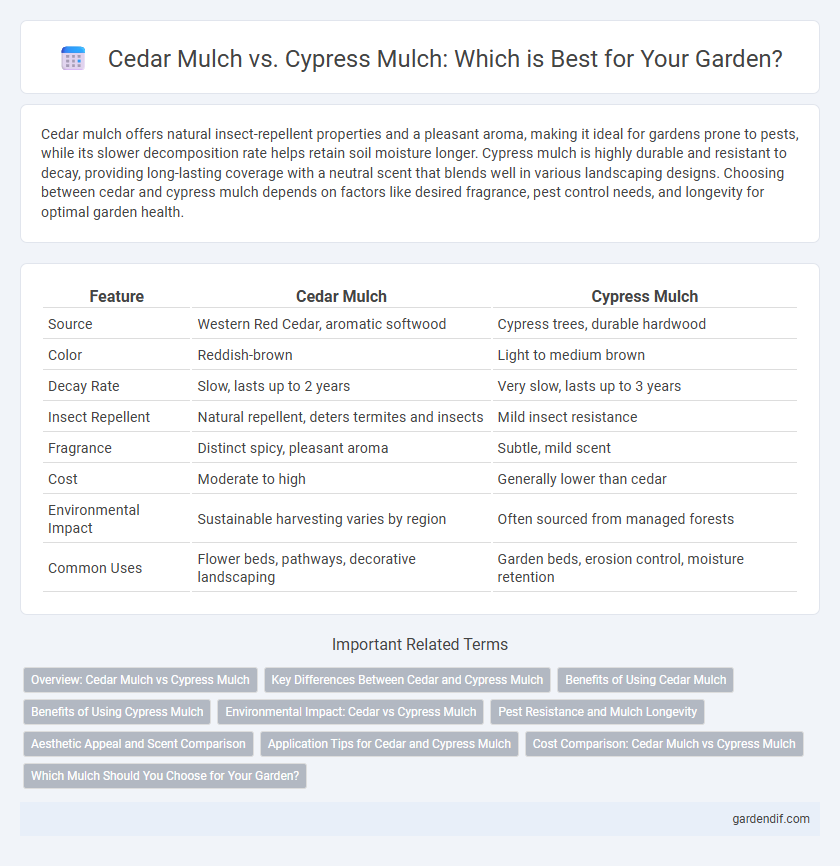
Cedar Mulch vs Cypress Mulch Illustration
Cedar mulch offers natural insect-repellent properties and a pleasant aroma, making it ideal for gardens prone to pests, while its slower decomposition rate helps retain soil moisture longer. Cypress mulch is highly durable and resistant to decay, providing long-lasting coverage with a neutral scent that blends well in various landscaping designs. Choosing between cedar and cypress mulch depends on factors like desired fragrance, pest control needs, and longevity for optimal garden health.
Table of Comparison
| Feature | Cedar Mulch | Cypress Mulch |
|---|---|---|
| Source | Western Red Cedar, aromatic softwood | Cypress trees, durable hardwood |
| Color | Reddish-brown | Light to medium brown |
| Decay Rate | Slow, lasts up to 2 years | Very slow, lasts up to 3 years |
| Insect Repellent | Natural repellent, deters termites and insects | Mild insect resistance |
| Fragrance | Distinct spicy, pleasant aroma | Subtle, mild scent |
| Cost | Moderate to high | Generally lower than cedar |
| Environmental Impact | Sustainable harvesting varies by region | Often sourced from managed forests |
| Common Uses | Flower beds, pathways, decorative landscaping | Garden beds, erosion control, moisture retention |
Overview: Cedar Mulch vs Cypress Mulch
Cedar mulch offers natural insect-repellent properties and a distinctive aroma, making it ideal for garden beds where pest control is a priority. Cypress mulch is known for its durability and slow decomposition rate, providing long-lasting ground cover with minimal maintenance. Both mulches improve soil moisture retention and temperature regulation but differ in aesthetic appeal and environmental impact.
Key Differences Between Cedar and Cypress Mulch
Cedar mulch offers long-lasting durability and natural insect-repellent properties due to its aromatic oils, making it ideal for pest control around plants. Cypress mulch provides excellent moisture retention and resists decomposition well, contributing to soil health and erosion prevention. Differences in color, scent intensity, and sustainability also distinguish cedar mulch's reddish hue and strong aroma from cypress mulch's lighter tone and milder scent.
Benefits of Using Cedar Mulch
Cedar mulch offers natural insect-repellent properties due to its aromatic oils, making it highly effective for garden pest control while protecting plants. Its durability and slow decomposition rate provide long-lasting soil moisture retention and weed suppression, reducing maintenance frequency. Cedar mulch also enhances soil acidity, benefiting acid-loving plants such as azaleas and blueberries, and imparts a rich, reddish-brown color that improves landscape aesthetics.
Benefits of Using Cypress Mulch
Cypress mulch offers superior resistance to decay and insect damage due to its natural oils, making it a long-lasting option for landscaping. It improves soil moisture retention and temperature regulation, promoting healthier plant growth. This mulch also enhances aesthetic appeal with its rich, reddish-brown color and fine texture, which gradually weathers to a natural, attractive patina.
Environmental Impact: Cedar vs Cypress Mulch
Cedar mulch has a slower decomposition rate, which helps retain soil moisture longer and reduces the frequency of replacement, minimizing waste. Cypress mulch is sourced from cypress trees often harvested from wetland areas, raising concerns about habitat disruption and biodiversity loss. Choosing cedar mulch supports sustainable forestry practices more effectively due to its regeneration rates and less impact on sensitive ecosystems compared to cypress mulch.
Pest Resistance and Mulch Longevity
Cedar mulch offers superior pest resistance due to its natural oils that repel insects such as termites and ants, making it a durable choice for garden protection. Cypress mulch also provides moderate pest resistance but tends to break down faster because of its softer wood fibers, resulting in shorter mulch longevity. Choosing cedar mulch enhances both pest deterrence and long-lasting ground coverage for maintaining healthy soil conditions.
Aesthetic Appeal and Scent Comparison
Cedar mulch offers a rich reddish hue that deepens over time, providing a vibrant, warm aesthetic contrasted by cypress mulch's lighter, tan-brown color that brightens garden beds with a more subtle, natural look. The scent of cedar mulch is distinctly aromatic and fresh, known for repelling insects, while cypress mulch emits a milder, earthy fragrance that enhances ambiance without overwhelming. Both mulches improve landscape aesthetics but cater to different preferences in visual impact and olfactory experience.
Application Tips for Cedar and Cypress Mulch
Cedar mulch offers natural insect-repellent properties, making it ideal for garden beds and areas prone to pests, while cypress mulch's slow decomposition rate supports long-lasting soil moisture retention and weed suppression. Apply cedar mulch in a 2-3 inch layer around plants, keeping it away from tree trunks to prevent moisture buildup and rot. For cypress mulch, spread evenly in 3-inch layers to optimize soil protection and ensure aeration, promoting healthy root growth.
Cost Comparison: Cedar Mulch vs Cypress Mulch
Cedar mulch typically costs between $30 to $60 per cubic yard, while cypress mulch ranges from $25 to $55 per cubic yard, making cypress mulch generally more affordable. The price difference often depends on regional availability, with cedar mulch priced higher due to its aromatic properties and natural insect-repellent benefits. Homeowners choose between the two based on budget constraints and desired mulch longevity, as cedar mulch tends to last longer despite its higher cost.
Which Mulch Should You Choose for Your Garden?
Cedar mulch offers natural insect-repelling properties and a long-lasting aroma that deters pests, making it ideal for gardens prone to infestations. Cypress mulch is highly durable and resists decay, promoting soil moisture retention and preventing weed growth, which benefits areas with heavy rainfall. Choosing between cedar and cypress mulch depends on whether pest control or moisture management is the priority for your garden's specific needs.
Cedar Mulch vs Cypress Mulch Infographic

 gardendif.com
gardendif.com